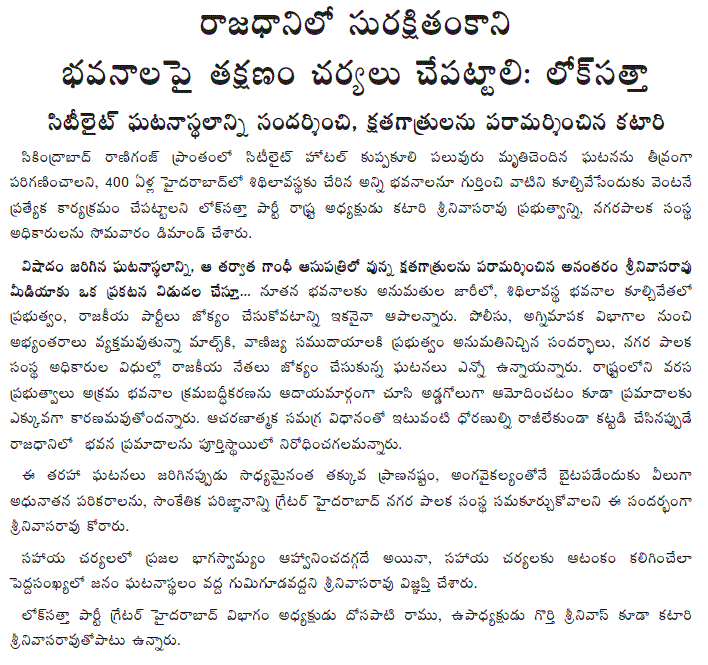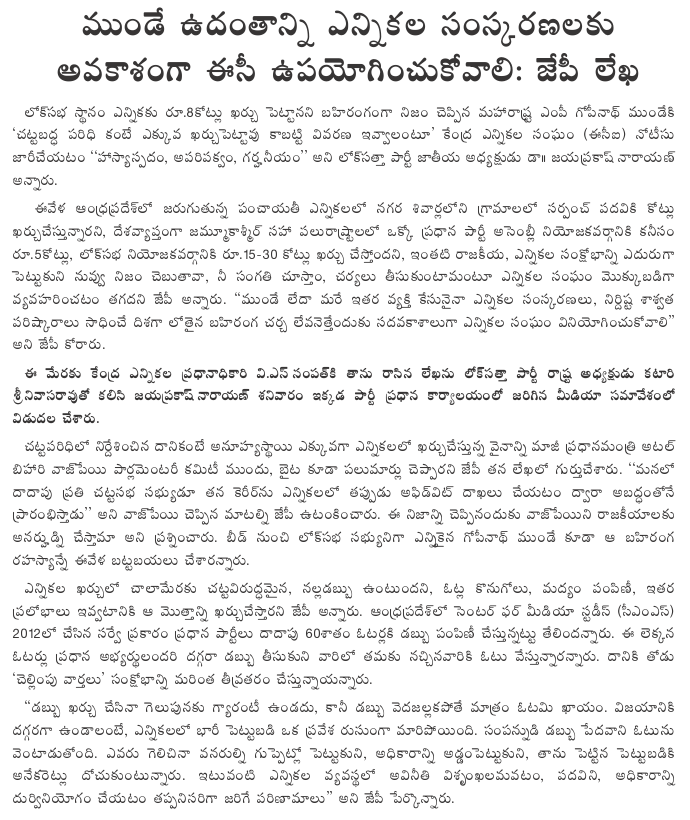6th July, 2013
To
Shri VS Sampath, IAS
The Chief Election Commissioner (CEC)
Election Commission of India (ECI)
Nirvachan Sadan, Ashoka Road
New Delhi – 110 001
Dear Sri Sampath ji,
The Election Commission of India (ECI) has recently served a notice to Shri Gopinath Munde, MP (Lok Sabha) in response to his public admission of incurring electoral expenditure significantly above the legally prescribed ceiling. However, this problem is not confined to that individual MP alone.
An overwhelming majority of the legislators across the country are routinely and openly spending enormous amounts that far exceed the prescribed limit - by twenty to thirty times in most cases, as a part of their electoral expenditure. In many states, Andhra Pradesh for instance, an expenditure of Rs. 5 crore is quite commonly incurred by candidates of each major party for the Assembly seat; it goes up to as high as Rs. 25-30 crore for a Lok Sabha seat. The well-reported testimony of the Former Prime Minister Atal Bihari Vajpayee before a parliamentary committee that “every legislator starts his career with the lie of the false election return he files” confirms the scale and magnitude of this grave democratic distortion. Today, the Lok Sabha MP from Beed has merely and openly acknowledged what has been public knowledge, all along.
At the same time, the real challenge underlying this issue is that most of the electoral expenditure involves the deployment of illegal, unaccounted for money for entirely illegitimate purposes such as vote-buying, distribution of liquor or offering other inducements. Increasingly, money is lavishly distributed to a large proportion of voters. Across India, the major parties and their candidates are offering voters direct and material inducements in the form of cash, liquor, etc. The Center for Media Studies (CMS)’s survey in Andhra Pradesh (in 2012) showed that the major parties are offering money to 60% of the voters. Given this, voters are taking money from all the major candidates and voting for whoever they want. Further compounding this problem is the growing menace of “paid news”. Electoral expenditure may not guarantee victory but non-expenditure guarantees defeat. Huge investment in elections has thus become an entry fee to have a realistic chance of success. Rich man’s money is chasing poor man’s vote and whoever gets elected then controls the levers of the state and earns multiple returns from office. Corruption, abuse of office and authority are the inevitable outcomes of such an electoral system.
That is why, it is time to examine this issue clinically, comprehensively and dispassionately and not from the lens of an isolated case that accidentally came to light. To confine oneself to the instant case and narrow grounds would be a perfunctory and bureaucratic response to a clear, present and growing crisis.
Instead, Mr. Munde’s or any other such individual case should be treated as an opportunity to generate serious public debate on electoral reforms and remedial action. Any such reforms must be focused on making rational and ethical politics sustainable by breaking the curse of the money power and constituency-based marginal vote; they should once again make it possible for men and women of commitment, calibre and broad public support to get elected. Only then could the present electoral politics of vote-buying and inducements be replaced by sensible and practical politics. A suitably designed electoral system that is broadly acceptable, easily achievable and has the minimal risk of unintended negative consequences is needed.
While the ECI has no powers to reform the electoral system, it certainly can catalyse a serious and fruitful debate towards the above objective among political parties, government, media and the civil society. We therefore urge you to focus on systemic reforms that would serve as an effective and permanent solution.
With warm personal regards,
Yours sincerely,
Jayaprakash Narayan
President
Copy to:
1. Shri H.S.Brahma, Election Commissioner
2. Dr. Syed Nasim Ahmad Zaidi, Election Commissioner




